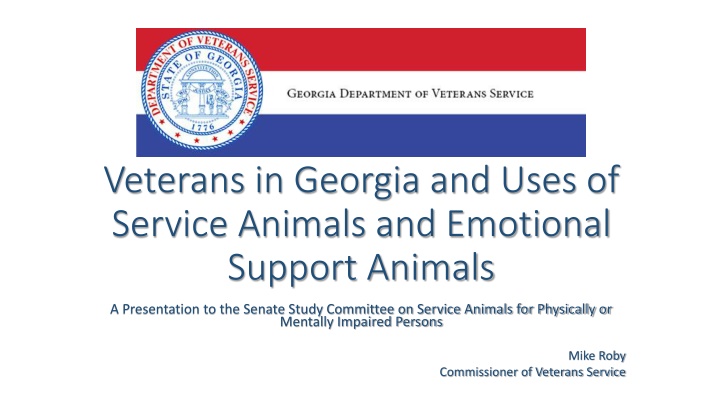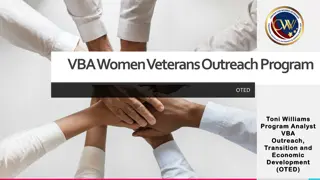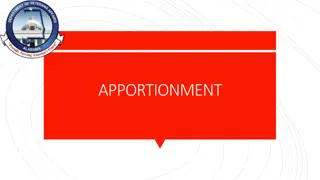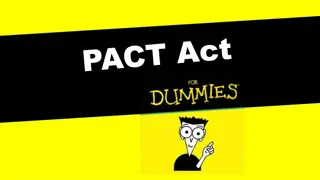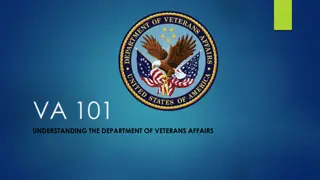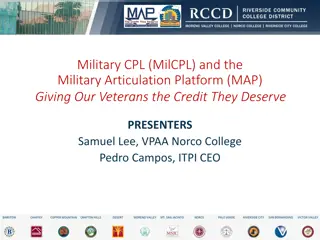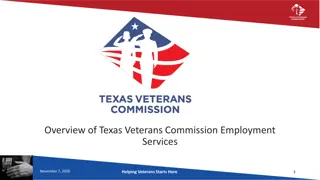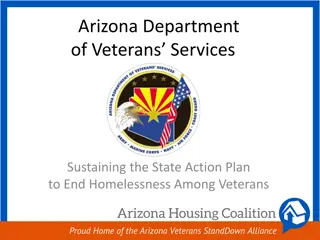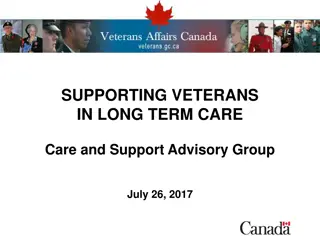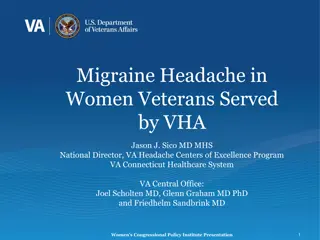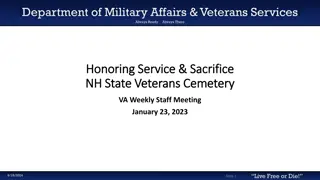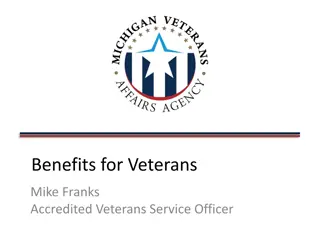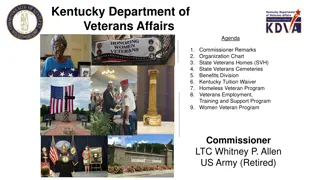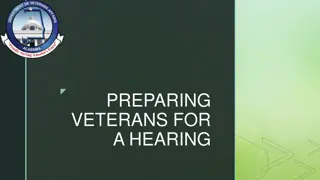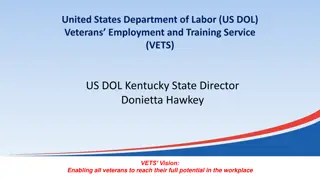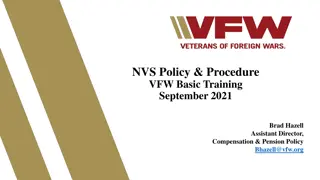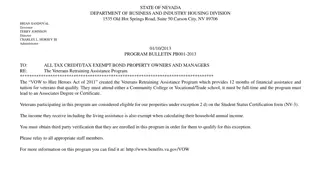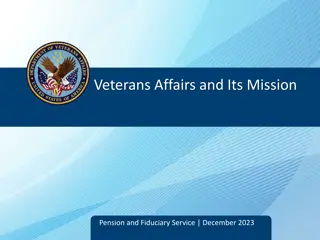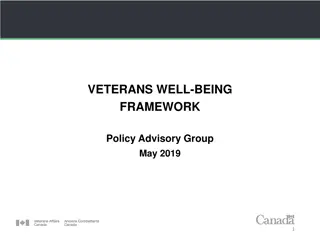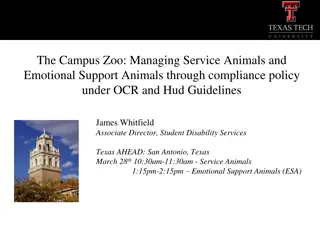Service Animals for Veterans in Georgia: A Guide to VA Guidance
Veterans in Georgia can benefit from service animals, including guide dogs and trained service animals, to assist with physical or mental impairments. The VA provides guidelines for evaluating, approving, and supporting veterans in receiving and caring for service animals. This includes information on the roles of guide dogs, service animals, emotional support animals, and the veterinary care covered by the VA.
Download Presentation

Please find below an Image/Link to download the presentation.
The content on the website is provided AS IS for your information and personal use only. It may not be sold, licensed, or shared on other websites without obtaining consent from the author.If you encounter any issues during the download, it is possible that the publisher has removed the file from their server.
You are allowed to download the files provided on this website for personal or commercial use, subject to the condition that they are used lawfully. All files are the property of their respective owners.
The content on the website is provided AS IS for your information and personal use only. It may not be sold, licensed, or shared on other websites without obtaining consent from the author.
E N D
Presentation Transcript
Veterans in Georgia and Uses of Service Animals and Emotional Support Animals A Presentation to the Senate Study Committee on Service Animals for Physically or Mentally Impaired Persons Mike Roby Commissioner of Veterans Service
VA guidance considers: Guide dogs: TRAINED to assist the blind Service animals: TRAINED to help those with severe to profound hearing loss by alerting the individual to a variety of sounds, or someone with a physical impairment that substantially limits mobility by assisting the performance of a wide variety of tasks depending on need and training, e.g., opening doors, retrieving, etc. Emotional support animals: protect someone, give emotional support or be a companion DO NOT QUALIFY AS SERVICE ANIMALS For purposes of service animals, the VA defines a disability to mean a physical or mental impairment that substantially limits one or more major life activities of an individual There must be a record of such impairment, or The individual is regarded as having such an impairment 2
VA guidance (Contd): The VA will approve the veteran receiving the use of guide dogs and service animals after the veteran is evaluated and approved by a prescribing clinician for The ability and means, including family or caregiver, to care for the animal currently and in the future Goals that are to be accomplished through the use of the animal Goals that are to be accomplished through other assistive technologies or therapies The VA does not provide the animals Veterans approved for animals by the VA are referred to Assistance Dogs International accredited agencies There is no charge by the VA for the animal or the associated training 3
VA guidance (Contd): VA pays for veterinary care and equipment, e.g., harness and/or backpack, required for optimal use of the animal Veterinary care includes prescribed medications, office visits for medical procedures and dental procedures where the animal is sedated (one per year) Initial vaccinations Subsequent vaccinations Prescribed food on a case-by-case basis Veterinary care does not include OTC medications, food, treats and non- sedated dental care (flea and tick medications are considered OTC and are the responsibility of the veteran) Grooming, boarding and other routine expenses are not covered 4
The VA does not issue or require certificates of training or licensing related to service animals or emotional support animals Service dogs are permitted on VA properties, except for National Cemeteries to ensure public safety, grounds and facilities care and maintenance control are not compromised. Areas included are: Open interment areas, except as approved to observe an individual interment or inurnment Construction or maintenance sites Grounds keeping and storage facilities Individuals accompanied by service animals while receiving treatment in a VA medical facility must provide VA with documentation confirming the service animals have had a current rabies vaccination as determined by state and local public health requirements and other current core canine vaccines dictated by local veterinary practice standards (e.g., distemper, parvovirus, etc.) 5
Generally, animals other than service animals, are not permitted to be present on VA property EXCEPTION: A VA facility may permit certain non-service animals to be present on VA property for the following reasons: Law enforcement purposes Animals under the control of the VA Office of Research and Development Animal assisted therapy animals (goal directed clinician supervised therapy) Animal assisted activity animals (not goal directed ~ emotional support) Animals participating in a VA Community Living Center (skilled nursing care) residential animal program or a Mental Health Residential Rehabilitation Treatment Program Animals may be present at National Cemeteries for ceremonial purposes during committal services, interments and other memorials (must not compromise public safety, facilities and grounds care and maintenance control standards) 6
The Georgia Department of Veterans Service operates two state war veterans homes and two state veterans cemeteries Generally, the homes and cemeteries follow the VA s policy regarding animals being present on the properties Augusta home: pet therapy program and occasional family pet visitations Milledgeville home: pet therapy program and occasional family pet visitations Glennville cemetery: follow the VA rules Milledgeville cemetery: follow the VA rules Neither of the war veterans homes currently have any veteran patients using service animals or emotional support animals 7
RECOMMENDATIONS FOR ESA LEGISLATION Make the emotional support requirements identical to or as close as possible to the requirements for service animals The individual must have a disability The animal must be trained to provide a task or service Use the Deardorff criteria for bona-fide disability diagnosis (outlined in the Wellborn & Wallace, LLC presentation to the study committee on August 20, 2018) where a mental health professional (MHP): Must support the Diagnostic & Statistical Manual of Mental Disorders (DSM) diagnosis of the patient resulting in the disability requiring the emotional support animal (ESM) Must show in detail how the ESA helps to ameliorate the disability related symptoms Must state whether or not the MHP observed the patient interacting with the ESA; if not, must justify why direct observation was not pursued and how the MHP concluded the results were valid Must discuss the possible negative effect should the patient not be able to live with the animal or take it with her/him the ESA must provide some benefit beyond that experienced by just having a pet The MHP should not write a letter unless it can be shown the ESA provides some demonstrable disability related benefit(s) to the patient The MHP should actually be familiar with research on ESA s (based on credentials; certification statement, etc.) 8
